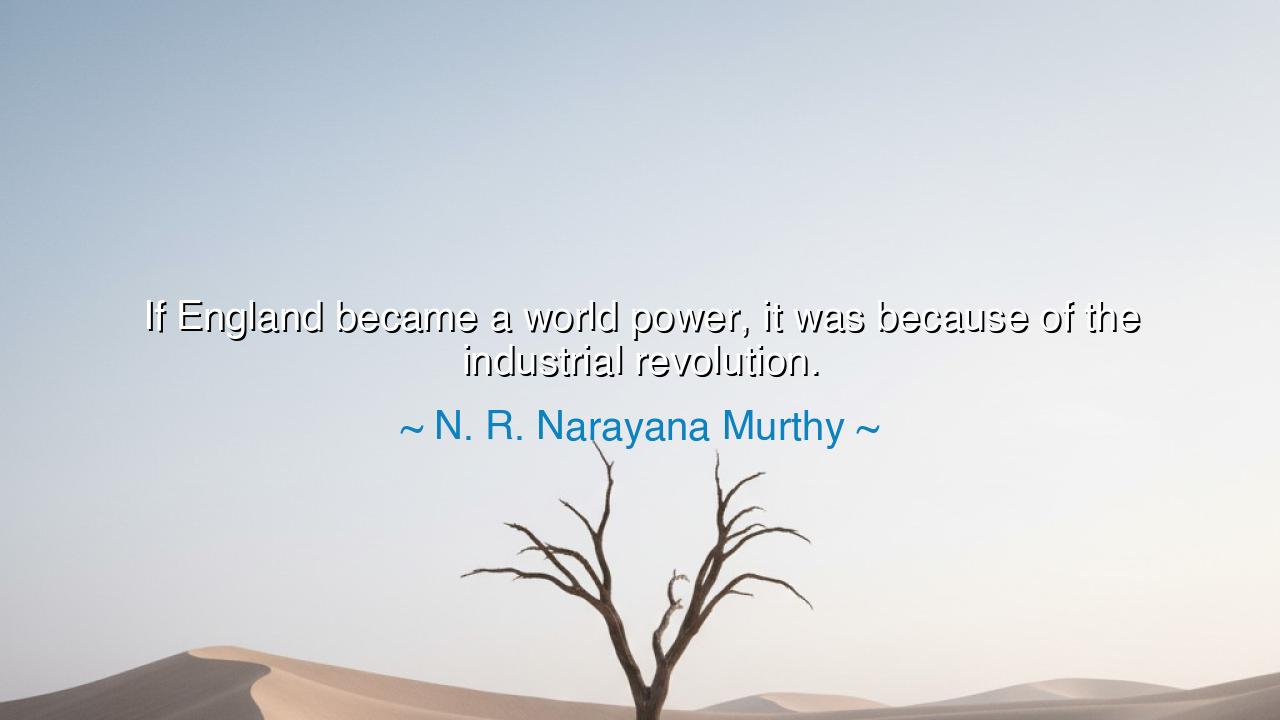
If England became a world power, it was because of the






N. R. Narayana Murthy, one of the great minds of modern entrepreneurship, speaks with a sharp clarity that echoes through the ages: “If England became a world power, it was because of the industrial revolution.” With these words, Murthy encapsulates a profound truth, that the rise of nations is often propelled by the forces of innovation, industry, and the courage to embrace change. In the case of England, it was not just its imperial ambitions that forged its path to greatness, but the industrial revolution, which transformed its land, its economy, and its place in the world.
The meaning of Murthy's statement lies in the deep understanding that true power—whether political, economic, or military—rests not only in force or conquest, but in transformation. The Industrial Revolution did not simply provide new tools, it reshaped society itself, turning agrarian economies into engines of mass production. England, once a small island nation, harnessed the forces of innovation, technology, and human ingenuity to establish itself as the cornerstone of the global economy. Through steam engines, mechanized factories, and the mastery of coal, it ascended to a dominant position, altering the world’s very landscape.
History offers many reminders of this transformative period. Consider the rise of James Watt, whose refinement of the steam engine became the heart of England’s industrial might. Before Watt’s work, England was a land of farms and small workshops, but his innovations powered factories, railways, and ships, laying the groundwork for an empire. As England built its industrial power, it also expanded its empire, establishing trade routes, colonies, and influence across the globe. The wealth of the nation surged, and with it, its ability to project military and political power across vast distances.
Yet, Murthy’s insight is not merely a historical observation, but a lesson for all nations. For progress does not come through stagnation, but through the willingness to adapt, to innovate, and to harness the forces of technology for the common good. Just as England rose to prominence through the application of industrial wisdom, so too can nations today shape their destinies by investing in innovation and embracing the opportunities that technology affords.
Therefore, let us remember that true power is not merely taken by force, but created through innovation. The legacy of the Industrial Revolution teaches us that nations that dare to change, to embrace new ideas and new technologies, will rise, while those that cling to the past may find themselves left behind. Murthy’s words remind us that England's greatness was not built on the laurels of conquest alone, but on the immense power of industrial transformation.






BKBui Kien
As a reader, I see this as both a factual and interpretive statement. England’s industrial transformation undeniably shifted global dynamics, but I’m curious about how this compares to modern technological revolutions. Is today’s digital revolution creating similar shifts in global power? If so, are we witnessing new ‘Englands’ emerging—nations leveraging innovation to reshape the world order, just as Britain once did?
CTTRUONG CONG THIEN
This statement feels accurate historically, but it raises a moral question: at what cost did England achieve this world power status? The Industrial Revolution brought innovation, yes, but it also relied on colonial extraction, child labor, and environmental damage. Can we celebrate industrial achievement without acknowledging the human and ecological toll that came with it? Power gained through progress isn’t always innocent.
NTDoan Thi Ngoc Trinh
I find this observation quite interesting because it highlights how economic transformation can redefine a nation’s place in the world. Still, I’d like to ask—did the Industrial Revolution truly make England powerful, or did it simply amplify existing structures of privilege and control? Perhaps industrialization was both a source of progress and exploitation, fueling global inequality even as it created prosperity at home.
LVH L V_DUY2K10
This quote makes a compelling point about the link between technological progress and global influence. I wonder, though, whether England’s rise was purely industrial or if political, colonial, and naval factors played equally significant roles. The Industrial Revolution may have provided economic muscle, but without empire and resource exploitation, could England have sustained such dominance? It’s fascinating how innovation and imperialism often fed into each other.